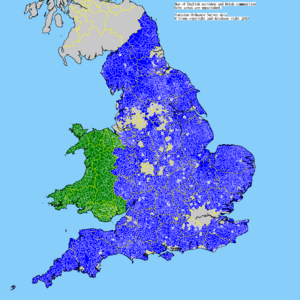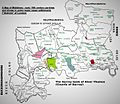Civil parishes in England facts for kids
In England, a civil parish is a local government area. It's the smallest level of local government, working below bigger areas like districts and counties. Think of it as an official area for local services, different from a church parish.
A parish council can choose to call itself a town, village, neighbourhood or community council. Some even have city status given by the King or Queen. Civil parishes cover about 35% of England's population.
There are no civil parishes in Greater London right now. Until 2008, new ones couldn't even be created there.
Contents
How Did Civil Parishes Start?
Old Beginnings
The idea of parishes started a long time ago. They were often linked to the manor system, where a local lord owned a large area of land. At first, the manor was important for local rules and justice.
Later, the church took over many local duties. They collected a local tax called a tithe, which was a share of farm produce. Helping the poor became the church's job, often managed by monasteries.
After the monasteries were closed down in the 1500s, a law in 1601, called the Poor Relief Act 1601, gave parishes the power to collect a local tax to help people in need. This was a big step for parishes in local government.
In 1965, civil parishes in London were officially ended when Greater London was formed.
Bringing Parishes Back
Today, people are encouraged to create new town and parish councils in areas that don't have them. A law in 1997 gave local people the right to ask for a new parish and council. This right was later extended to London boroughs in 2007. The City of London is now the only place in England where new civil parishes cannot be created.
If enough voters in an area sign a petition asking for a new parish, the local district council must consider it. The number of signatures needed depends on how many voters live there.
What Do Civil Parishes Do?
Local Services and Powers
Civil parish or town councils do many things to help their local area. They provide and look after local facilities like:
- Allotments (small plots of land for gardening)
- Bus shelters
- Parks and playgrounds
- Public seats and toilets
- Public clocks and street lights
- Village or town halls
- Various sports and fun facilities
They also help maintain footpaths, cemeteries, and village greens.
Since 1997, parish councils have gained new powers. They can now provide community transport, like a minibus. They can also help with crime prevention, such as setting up CCTV cameras. They can even contribute money towards making roads safer with traffic calming schemes.
Speaking for the Community
Parish councils are important because they share local opinions with bigger government bodies. They have the right to be asked for their views on any planning decisions that affect their parish.
They can also give money to local volunteer groups. Sometimes, they sponsor public events, like entering the "Britain in Bloom" competition.
Funding and Titles
The work of parish councils can vary a lot. Smaller ones might have fewer resources and do less. But some larger parish councils act almost like a small non-metropolitan district council.
Parish councils get their money by collecting a "precept." This is a small part of the council tax that people living in the parish pay for their homes.
Since 2007, a civil parish can choose to be called a "community," "neighbourhood," or "village" instead of just "parish."
The leader of a town council is usually called the "town mayor." If a parish council is also a city, its leader is usually called the mayor.
Where Are Civil Parishes Located?
Civil parishes are not found everywhere in England. There are none in Greater London, and very few in other large city areas.
Civil parishes come in many different sizes. Some are tiny, covering small hamlets with fewer than 100 people. Others are very large, covering towns with tens of thousands of residents. As mentioned, parishes could not be set up in London until the law changed in 2007, and none have been created there yet.
Related pages
- List of civil parishes in England
Images for kids
See also
 In Spanish: Parroquia civil (Inglaterra) para niños
In Spanish: Parroquia civil (Inglaterra) para niños



